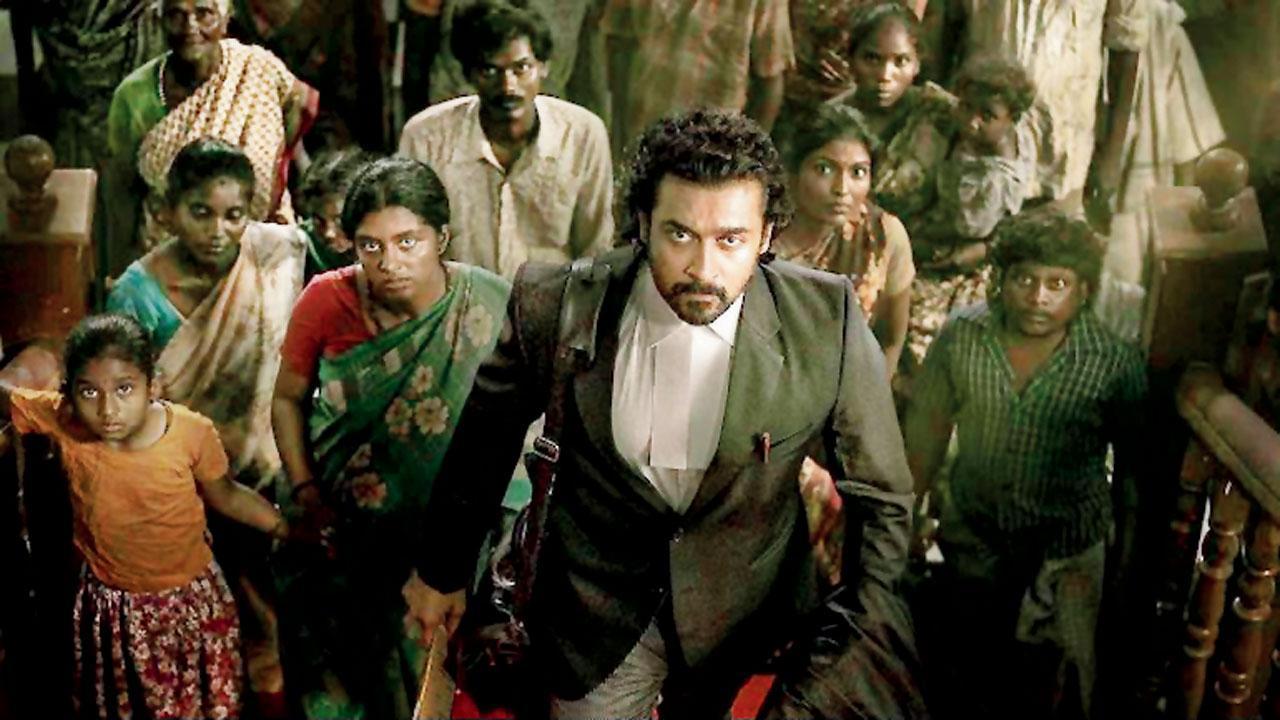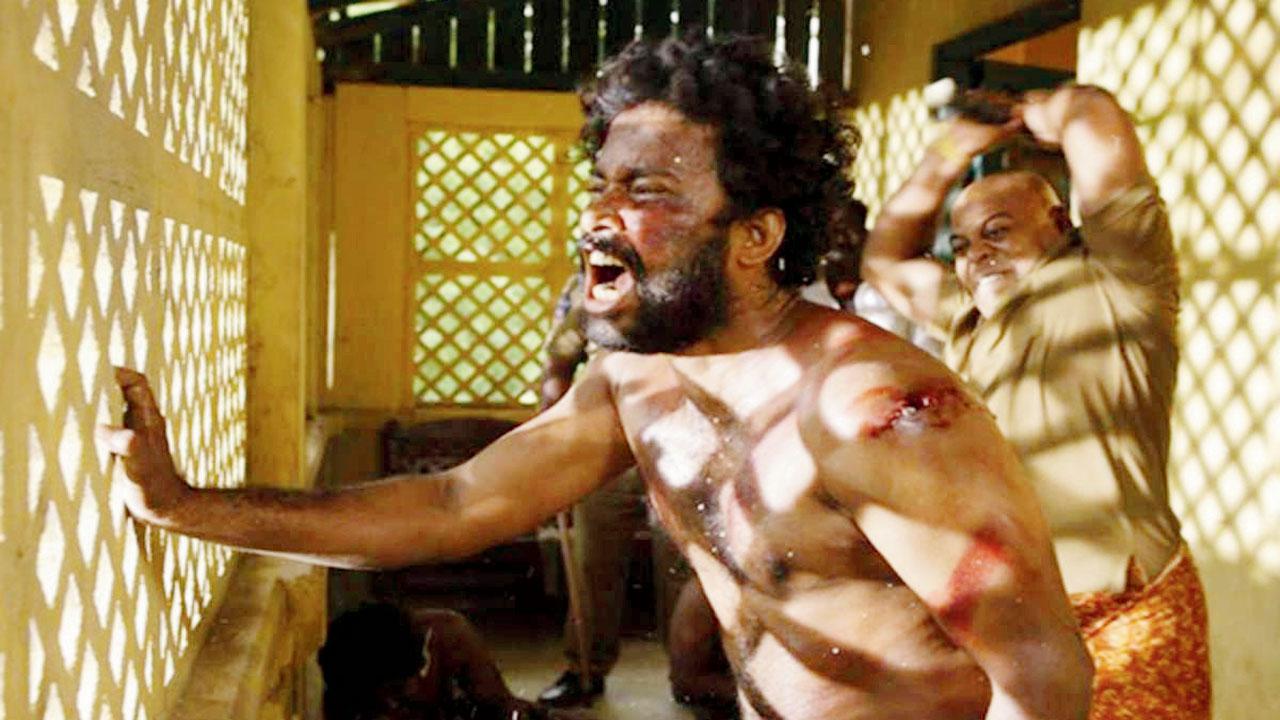Of all Indian cinemas, none I’ve come across lately, besides Tamil, that places caste as so central to its theme

A still from the Netflix film Jai Bhim
 I’m wondering (aloud) if the Academy Award jury watching Visaranai—India’s entry for Best Foreign Film Oscar in 2017—got the fact that the film was about labourers from Tamil Nadu, crossing over for better work opportunities, to Andhra Pradesh. And getting further exploited as a result, because they only spoke Tamil, as against the local Telugu. The two languages could sound the same to an international jury. Did the movie somewhat miss out, therefore?
I’m wondering (aloud) if the Academy Award jury watching Visaranai—India’s entry for Best Foreign Film Oscar in 2017—got the fact that the film was about labourers from Tamil Nadu, crossing over for better work opportunities, to Andhra Pradesh. And getting further exploited as a result, because they only spoke Tamil, as against the local Telugu. The two languages could sound the same to an international jury. Did the movie somewhat miss out, therefore?
ADVERTISEMENT
And I ask this because that bit is sort of central to the film on extreme custodial torture, and the deep (police) state. Visaranai itself, cinematically speaking—as with other works of one of India’s most powerful filmmakers, Vetrimaaran—is as universal as it gets.
Something I can’t tragically say (if you can keep this between us) about Tamil mainstream cinema in general, where melodrama is the main language, excessive heroism the sole purpose, and sometimes things head so many feet over-the-top (still a few floors below commercial Telugu), that it becomes hard to reach it as an audience, at all. There’ll always be those, say, Shankar, Kamal Haasan, or Mani Ratnam (from the past), breaking the mould from within.

A still from the film Visaranai
Still, it’s essentially a palette/genre thing. Which is why I’d rather keep quiet than nag anyone over not being as swayed by Pa Ranjith’s period boxing flick, Sarpatta Parambarai (2021). Or opine, unless specifically asked, why Sudha Kongara’s Soorarai Pottru (2020) is okay ’n all—but it doesn’t feel like a solid biopic of aviation pioneer Captain GR Gopinath (starring Suriya).
Also a reason I initially stayed away from TJ Gnanavel’s Jai Bhim, based on an important, 1993 legal case concerning custodial torture/death of a tribal man—booked for a petty crime, given pressure from higher-ups; and subsequent cover-up by the system full of opportunists, to deny his family, justice. A public-interest lawyer fights this case, on behalf of the labourer from the Irulas tribe. This upper-caste attorney’s part is based on K Chandru, who later retired as Madras High Court judge.
What if he starts dancing, I thought, because Suriya (after Gopinath) is in a biopic, of sorts! The role itself instantly hearkens back to Govind Nihalani’s directorial debut, Aakrosh (1980), scripted by Vijay Tendulkar, with Naseeruddin Shah as the upper-caste lawyer, appointed as legal aid for an adivasi man, Om Puri, on trial for alleged murder of his wife.
But that was an art-house film. Meaning, cinema so parallel to an ‘entertaining’ mainstream, that it consciously shuns all its ingredients. Naseer as hero is terrified of being attacked by goons. Om doesn’t utter a word. Music is minimal/folk. Pace is slackened. Film ends, even while the case is on. Guess that’s how life is!

A still from the Tamil film Mandela
It directly touched upon caste though. Something Hindi popular cinema seldom did—with its own tradition of stars with the pseudonym Kumar, also playing characters with the same casteless surname. Jai Bhim is obviously titled after the father of India’s Constitution, Bhimrao Ambedkar, whose name remains a battle-cry against Dalit oppression. This isn’t a surprise.
Of all Indian cinemas I’ve perfunctorily followed lately, none have placed caste as central to its theme/politics as Tamil films have. Even for a movie named after Mandela (2021)—Madonne Ashwin’s brilliant allegory on India’s obsession with elections, as the only aspect of democracy to understand, a voter called Mandela can swing results. Him being low-caste trumps that all-important identity still.
Pa Ranjith’s Rajinikanth starrer Kaala (2018) remains the most full-frontal, mainstream statement on Dalit rights/equality of late. Even in Visaranai, if you notice, the falsely implicated labourers get help from a Tamil cop in Andhra, because of caste, rather than language. Tamil policeman who saves them is Dalit. So are they.
Jai Bhim, in its brutal portrayal of custodial torture, is very Visaranai. As an idol-worshipping temple, it is much less Kaala. You care for Suriya as the lead Chandru just enough as a bridge for an ‘empathy generating machine’ that great movies can be—connecting you to the lives of socially distant others. Restoring faith in clichés such as truth, which alone triumphs. What’ve we got if not optimism?
Never mind the slightly dated symbolism of Marx and Lenin on table and wall. You wanna be like Chandru. Doing the right thing! That care/empathy doesn’t remain with audiences for too long, I know. But which emotion does?
Further, the two judges of Madras High Court in the movie remain the real heroes, all through—choosing equality and human rights, over all other legalese, to deliver justice—their reason for precious existence. Making exceptions while admitting a ‘habeas corpus’ petition (to produce the person, charged with a crime, before a courtroom).
Jai Bhim is set in 1995. Its point goes beyond caste and its timeline then. The film decidedly belongs to 2021. Especially at a time in India, when we couldn’t possibly hope more, for heroes in coats to return.
It’s not my case, my lord—only been all over social media and newspaper columns repeatedly over quite a few years now.
Mayank Shekhar attempts to make sense of mass culture. He tweets @mayankw14
Send your feedback to mailbag@mid-day.com
The views expressed in this column are the individual’s and don’t represent those of the paper.
 Subscribe today by clicking the link and stay updated with the latest news!" Click here!
Subscribe today by clicking the link and stay updated with the latest news!" Click here!








